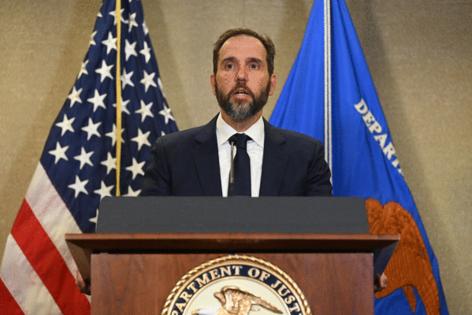Justice Department moves to drop Trump prosecutions in Washington and Florida
Published in News & Features
WASHINGTON — The U.S. Justice Department has moved to end its pursuit of criminal charges against Donald Trump, signaling a conclusion to the extraordinary federal prosecution of a former president whose reelection ensured he’d be shielded from charges in the White House.
Special Counsel Jack Smith, who charged Trump with illegally conspiring to obstruct the 2020 election and with mishandling sensitive national security information after he left office, filed papers in court on Monday indicating the department would no longer move forward with either case against the president-elect.
The special counsel’s office is seeking to dismiss the election obstruction indictment against Trump in Washington in its entirety. In the classified records case, prosecutors said they won’t pursue an appeal to revive charges against Trump, but will press ahead with a challenge to a Florida federal judge’s dismissal of charges against his two co-defendants. The judge ruled earlier this year that Smith’s appointment was unconstitutional and tossed out the case.
Justice Department policy bars the prosecution of sitting presidents, forcing Smith’s hand to unnwind the cases against Trump after he won the election. Trump, who denied wrongdoing, said he would fire Smith and order the department to close the special counsel’s work if he won a second term.
Smith wrote that his office “stands fully behind” the merits of the election obstruction case but the department’s prohibition on charging and prosecuting sitting presidents was “categorical.” The department asked the judge to dismiss the case “without prejudice,” leaving open the possibility that the prosecution effort could be revived once Trump leaves office.
The decision to end the case “does not turn on the gravity of the crimes charged, the strength of the Government’s proof, or the merits of the prosecution,” he wrote.
Smith is expected to resign as special counsel before Trump is sworn in. It wasn’t immediately clear which Justice Department office would take over the Florida prosecution, but once he’s in the White House Trump could order prosecutors to fully drop the appeal or to pardon the co-defendants, Waltine “Walt” Nauta and Carlos De Oliveira.
Trump’s latest pick to lead the Justice Department, former Florida attorney general Pam Bondi, was one of the attorneys that signed a friend-of-court brief backing Trump’s position on appeal that Smith’s appointment was unconstitutional.
Neither federal case against Trump came close to a trial. The notices on Monday represented a vindication of the legal strategy pursued by Trump’s lawyers, who pushed for delays and later hearing dates at every turn as the clock ticked down to Election Day.
Trump spokesperson Steven Cheung said in a statement that the special counsel’s decision was “a major victory for the rule of law.”
Historic indictments
Trump was the first former president indicted on felony charges. He also faced two state prosecutions, and the fate of those cases remains unsettled as he prepares to return to Washington.
A New York jury found Trump guilty of falsifying business records to cover up hush money payments to a former adult film star who claimed to have had a sexual relationship with him. A judge has delayed sentencing in that case as he decides how to proceed. In Georgia, a prosecution over his efforts to overturn the 2020 election have been on hold amid controversy about the lead prosecutor’s personal conduct.
State prosecutors aren’t bound by the same rules as the Justice Department.
Attorney General Merrick Garland appointed Smith as special counsel to take over the two federal investigations after Trump formally announced his campaign for president two years ago.
The classified documents case came first. A Florida grand jury indicted Trump in June 2023 on charges that he unlawfully held onto a cache of classified documents and then conspired with two associates to stymie U.S. efforts to get those materials back. U.S. District Judge Aileen Cannon dismissed the case after concluding that Smith’s appointment and the special counsel office’s funding were unconstitutional.
The 11th U.S. Circuit Court of Appeals hasn’t scheduled arguments yet in the government’s appeal of Cannon’s order. The department is expected to file its next brief as it presses ahead with the attempt at resurrecting the case against Trump’s co-defendants.
In August 2023, a grand jury in Washington returned the federal election obstruction indictment. U.S. District Judge Tanya Chutkan had set a trial for March. But the prosecution effort became mired in a fight over whether the former president was entitled to absolute immunity from charges he argued related to official duties.
In a decision split along ideological lines, the U.S. Supreme Court held this summer that presidents are entitled to sweeping protection from charges related to their official duties. The parties were back before a district court judge this fall to fight over the precise contours of that immunity and whether any of the indictment could survive.
The Washington case isn’t officially over until Chutkan grants the government’s motion to dismiss the indictment. Judges generally have little authority to rebuff prosecutors in these types of situations, especially before there’s been a trial or any factual findings. During Trump’s first term, a judge ordered a review of the Justice Department’s move to drop a criminal case against a Trump ally, former National Security Adviser Michael Flynn, but that happened after Flynn pleaded guilty. The case ended when Trump pardoned Flynn.
-------
With assistance from Chris Strohm.
©2024 Bloomberg L.P. Visit bloomberg.com. Distributed by Tribune Content Agency, LLC.







Comments